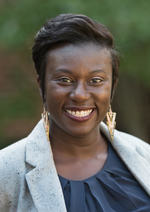
Colleges and universities seeking to increase student diversity should examine their methods of recruitment and decrease their focus on national college admissions tests, such as the SAT and the ACT, according to a George Mason University expert on diversity and inclusion.
“Standardized tests like the SAT are not an accurate measure of success while students are in college, but more of an indication of which students have the economic advantage for test prepping,” said Shekila Melchior, director of Mason’s Office of Diversity and Inclusion in the College of Education and Human Development. “These tests act mostly as barriers for people with diverse backgrounds trying to get into college.”
George Mason University has been test-optional for undergraduate applicants since 2006, making it an early adopter of such policies.
There are other ways to determine students’ potential success for college, such as high school grades, work experience and any challenges they have overcome, said Melchior. Too much of the college admissions process is weighed in favor of students with connections and wealth, she added.
“One thing that the recent admissions scandals have shed light on is the impact our capitalistic society has had on the admissions process of four-year institutions,” said Melchior, assistant professor and academic program coordinator for CEHD’s counseling program.
Colleges and universities seeking to diversify their student body should focus on recruitment efforts, said Melchior.
“What high schools are you going into to recruit students and what are you saying to the students? Have you created a pipeline for your Black and brown students from high school to college to graduate school?” said Melchior. “These are the questions to be asking.”
College administrators also need to examine what barriers their Black and brown students face at the institutional level, said Melchior, such as difficulty in accessing financial aid.
“Colleges and universities need to ask themselves: Will these students feel safe on our campus if they come? Will they feel a sense of belonging? Will they see themselves in the people that will be teaching them?” said Melchior.
Melchior, a former high school counselor, also said that high schools should encourage and engage all students as early as possible about their college options. Students who would be first-generation college students may get overlooked by their high school college counselors during the application process, she said, and need outreach. In addition, counselors should examine their own biases when it comes to their Black and brown students and their potential for college success, she added.
“If what you are doing as a college counselor is having the students come to you for help, then you may just be getting the students whose parents know what the process is about,” said Melchior. “Meet with all your students if you can in their junior year. Help students with the application process, including financial aid. Look for scholarships that are available and bring students into your office that you think could benefit from them.”
To reach Shekila Melchior directly, contact her at smelchio@gmu.edu
For more information, contact Anna Stolley Persky at apersky@gmu.edu
About George Mason
George Mason University is Virginia’s largest public research university. Located near Washington, D.C., Mason enrolls more than 39,000 students from 130 countries and all 50 states. Mason has grown rapidly over the past half-century and is recognized for its innovation and entrepreneurship, remarkable diversity and commitment to accessibility.
